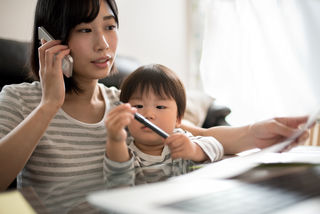Guilt
The Triple Bind: Moms Who Work
Recent research explores mothers' guilt about the impact of a career on kids.
Posted September 27, 2018
Steve Hinshaw argues that adolescent girls face an impossible situation—a triple bind—striving for perfection in far too many realms than it is possible to achieve.1 Pressure to be beautiful, to be caring and empathic, and to be successful, all without breaking a sweat. This may be one unintended consequence of the fact that girls’ opportunities for professional advancement are now almost equal to those of boys, resulting in pressure to achieve in the academic sphere. This pressure might be tolerable if it weren’t for the fact that the standards formerly applied to girls—pressures to be pretty, to be nurturing caregivers (with all of the domestic and interpersonal giving that entails), and to make it all look easy—are still going strong.
I fear the same phenomenon that Hinshaw described in adolescent girls applies to mothers, and maybe even to all women. Now that we (thankfully) have more employment opportunities, we seek to achieve in that realm, yet the pressure for mothers to be involved with their children is also at its apex.2,3 We have to be everything to everyone—mothers who are loving and available to their children; professionally competent (not to mention friendly, willing to do more of the service work, not bossy, and not intimidating in the workplace); and don’t forget being supportive partners, friends, and daughters. This might be fine if we were able to simply aspire to these goals and accept that we will often fall short, but sadly, our feelings aren’t typically that well-behaved. What develops when we inevitably fail to live up to expectations is guilt, that far-too-familiar emotional space in which our memories reside, packaged up like an old photo album, flashes of all of the times we have let others down. While some of this proclivity to linger in feelings of guilt may be dispositional, I suspect that much of it isn’t.
Wondering about the universality of this guilt, several years ago, my college roommate, Sarah Birken, also a professor and a mother, wrote an article4 regarding the issues that academic mothers encounter in today’s workforce. Birken has continued to explore this issue by discussing it with other academic mothers at her university and even beginning a podcast (the forthcoming AcaDames). As for me, I turned to the tool I love most—science—to collect data to answer what should have been a question answered long ago: Do working mothers experience more guilt about working than working fathers? We proceeded to conduct a series of studies5,6,7 designed to answer this relatively simple question that had not yet been quantitatively assessed in the United States.

The answer? A resounding yes. We found that as compared to full-time working fathers, full-time working mothers endorsed feeling more guilt about the negative impact of working on their children than fathers—this guilt was expressed in open-ended narratives they provided about their parenting and also in their responses to closed-ended questions designed to assess guilt about work-interfering-with-family. Our data revealed that working mothers’ guilt about the negative impact of working on children was not explained by the general tendency for women to experience more other-focused negative emotions, such as guilt. Further, guilt about working was higher among mothers whose work posed greater conflicts with family obligations (in terms of hours, work-related travel, etc.).
I don’t spend enough time taking care of my family.
I do the best that I can but it never seems to be enough.
…I’m missing out on a lot of family moments I will never get back.
I wish I had some time for myself, but then that makes me feel guilty for not spending it with the kids. There is no winning scenario.5
Couldn’t have said it better myself, Participant 306—there is no way to win. The most ironic of all findings from our studies is that the guilt itself was associated with lower-quality parenting behavior (permissive parenting) as reported by the participants.6 In our latest study, we randomly assigned some participants to imagine that a work conflict kept them from attending their child’s school event and compared their behavior in a parenting task to those participants who were asked to imagine missing their child’s school event due to illness—those parents who reported anxiety in relationships and imagined work, rather than illness, preventing them from “being there” for their kids gave up more quickly when they were asked to soothe a baby in our simulated parenting paradigm, though in this study, the effect wasn’t stronger among mothers.7
In other words, what we have found is NOT that working itself results in lower quality parenting, but that guilt regarding the negative impact on children itself may be associated with lower quality parenting. Perhaps guilt about the pain they feel they have already caused their children (by virtue of working) robs parents of their ability to respond with firm limits to children’s challenging behavior; alternatively, guilt may burden parents such that they cannot effectively attend and respond to children’s needs. How’s that for a Catch-22?
Do changing gender roles offer a potential solution? Meaning, as fathers become more involved in parenting, will this rid us working mothers of our guilty states? Sadly, it seems unlikely. Men who take on more caregiving and domestic responsibilities could just experience emotional fallout the same way women do. Drawing from our own work, I wonder whether mothers are reminded of conflicts between work and family more often by peers, employers, and broader societal messaging, which is what causes the guilt and variability in parenting behavior.7 If fathers are increasingly expected to be jacks of all trades, they may be more frequently aware of these work-family conflicts, which could impact their parenting as well.
Worse yet, I fear that this is something that plagues all women, not just working mothers—that mothers who don’t work feel guilty for not contributing to the finances (or perhaps inferior to mothers who do), and that working women who are not mothers feel "less than" because they have not checked all the boxes. I can certainly think of examples of women who violate this prediction, but my gut says that the general trend would be toward feeling deficient.
So what’s the solution? I wish there were a magic pill, but I think it’s going to take us women finding our value, believing that we are good and loved without having to excel in all areas, and maybe without having to excel in any areas. We could get there by accepting ourselves, missed tee-ball games and all, and extending that type of unconditional acceptance to others around us. We can talk about the times we weren’t able to make the deadline or the baked goods with self-compassion instead of criticism. And then we can spread this wisdom all over the place, being the first to ask the male family member (as opposed to the woman) to cook the dish for the potluck. How can men help? Be the one to volunteer to take a larger share of the service tasks at work or to set up the food for a party. Take a page from my husband’s book—when he is out shopping with our three kids and gets a compliment from an admiring shopper (usually female), he has a comment and a sly smile at the ready “Why thank you—and I also work!” Let’s get out of this bind together.
References
1. Hinshaw, S., & Kranz, R. (2009) The triple bind: Saving our teenage girls from today’s pressures. New York: Ballantine Books.
2. Milkie, M. A., Nomaguchi, K. M., & Denny, K. E. (2015). Does the Amount of Time Mothers Spend with Children or Adolescents Matter? Journal of Marriage and Family, 77, 355-372. doi:10.1111/jomf.12170
3. Milkie, M. A., & Peltola, P. (1999). Playing All the Roles: Gender and the Work-Family Balancing Act. Journal of Marriage and Family, 61, 476-490. doi:10.2307/353763
4. Birken, S. A., & Borelli, J. L. Coming Out as Academic Mothers. Chronicle of Higher Education. January 14, 2015. http://chronicle.com/article/Coming-Out-as-Academic-Mothers/151157/
5. Borelli, J. L., Nelson-Coffey, S. K., River, L., Birken, S. A., & Moss-Racusin, C. (2017). Gender differences in work-family guilt in parents of young children. Sex Roles, 76, 356-368. doi: 10.1007/s11199-016-0579-0
6. Borelli, J. L., Nelson-Coffey, S. K., River, L. M., Birken, S. A., & Moss-Racusin, C. (2017). Bringing work home: Gender differences in work-family guilt among parents of toddlers. Journal of Child and Family Studies, 26, 1734-1745. doi:10.1007/s10826-017-0693-9
7. River, L.M., Borelli, J. L., & Nelson-Coffey, S. K. (in press). Tolerance of infant distress among working parents: Examining the roles of attachment anxiety and work-family conflict. Parenting: Science & Practice.
Acknowledgements. Thanks to Todd Shimoda whose design brilliance resulted in the creation of our simulated infant cry task. And to Steve Hinshaw, Laura River, Sarah Birken, and S. Katie Nelson-Coffey, who read and commented on prior drafts of this piece.




